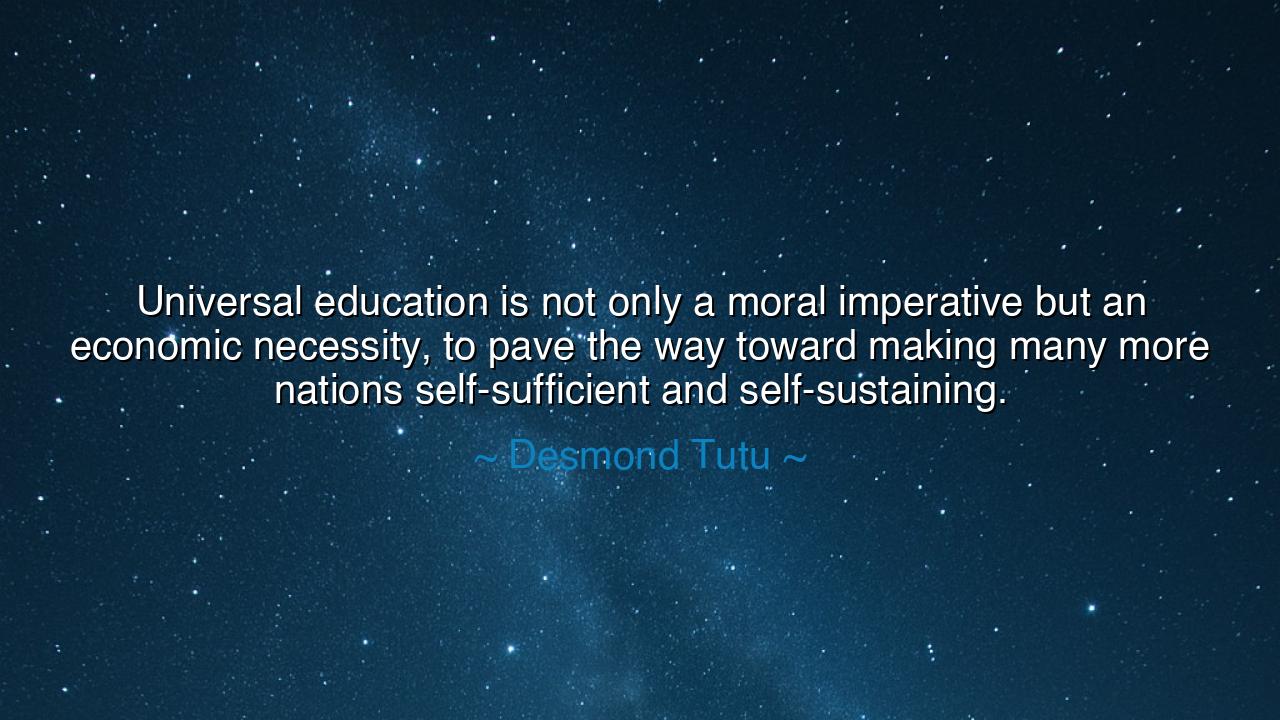
Universal education is not only a moral imperative but an
Universal education is not only a moral imperative but an economic necessity, to pave the way toward making many more nations self-sufficient and self-sustaining.






Hearken, O children of tomorrow, to the voice of Archbishop Desmond Tutu, who with the fire of a prophet declared: “Universal education is not only a moral imperative but an economic necessity, to pave the way toward making many more nations self-sufficient and self-sustaining.” These words are not light as the wind, but heavy with truth, for they call both the heart and the mind to judgment. They proclaim that education is not a luxury of the privileged, nor a gift bestowed sparingly, but the very foundation upon which nations rise or fall.
The origin of this utterance lies in the furnace of South Africa, where Tutu fought against the chains of apartheid. He had seen with his own eyes how the deliberate starvation of minds through unequal schooling could cripple a people, and how ignorance was used as a weapon to enforce submission. For him, the cry for universal education was not born in theory, but in the struggle for freedom itself. It was both a moral imperative—for every human being deserves the dignity of knowledge—and an economic necessity, for no people can prosper when vast numbers are left in darkness.
Behold, then, the deep wisdom: education is not merely the adornment of the individual, but the lifeblood of nations. Without it, a country must beg from others, forever dependent, forever shackled. With it, a people may till their own fields, build their own industries, govern their own laws, and craft their own destiny. Thus Tutu speaks of self-sufficiency and self-sustaining strength: not to be fed by others, but to become a tree rooted in its own soil, bearing fruit for generations.
Consider the example of post-war Japan. After devastation and ruin, the nation did not rebuild merely through factories or armies, but through an unwavering commitment to education. Schools became the seedbeds of recovery, and knowledge the tool by which the people restored themselves. In a few decades, Japan rose from ashes to economic power, not by chance, but by the deliberate cultivation of minds. Here we see Tutu’s words embodied: education as both a moral duty to uplift all, and an economic path to independence.
And ponder, too, the bitter contrast: nations where education is denied, where children labor in fields or factories instead of classrooms. There, poverty becomes a chain passed from father to son, mother to daughter, generation to generation. Such societies remain dependent, their futures mortgaged to foreign powers, their voices silenced in the councils of nations. This is why Tutu thundered that the denial of universal education is not only injustice—it is folly.
What lesson then shall we take from this? That to build a just and prosperous world, each one of us must labor for the spread of education. Support the schools, lift up the teachers, provide books where there are none, and open the doors of learning to girls as well as boys, to the poor as well as the rich. For every child given the gift of knowledge is a light against the darkness, a stone laid in the foundation of a nation’s strength.
Practical actions lie close at hand: sponsor a child’s schooling, defend the libraries in your towns, raise your voice for policies that make learning accessible to all. And in your own household, do not let ignorance take root—read, study, and pass on the flame of wisdom. For in the end, it is not governments alone that build self-sustaining nations, but the united labor of communities who cherish education as both duty and treasure.
Thus, let Tutu’s words be a banner over your lives: education is the seed of dignity, the wellspring of freedom, the engine of prosperity. To deny it is to cripple the future; to spread it is to build eternity. Let us then hasten the day when every nation stands tall, self-sufficient, self-sustaining, and radiant with the light of universal education.






AAdministratorAdministrator
Welcome, honored guests. Please leave a comment, we will respond soon